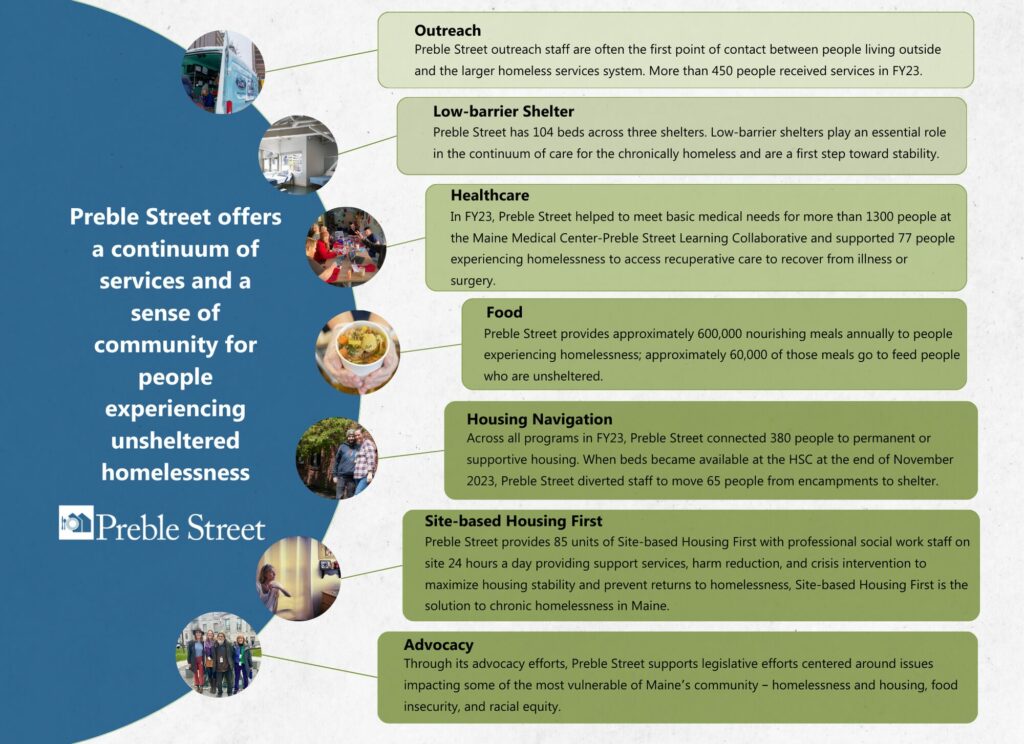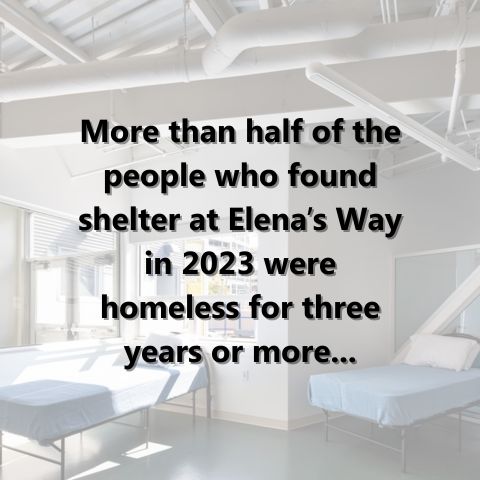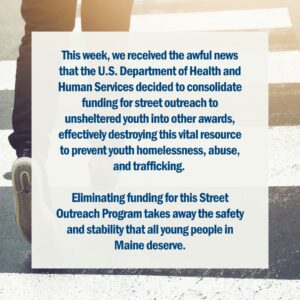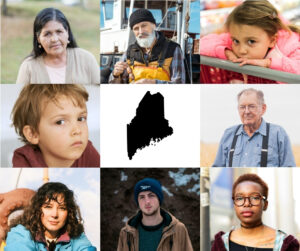What does a low-barrier shelter look like?
At a time when unsheltered homelessness is increasing exponentially in our community and the shortage of low-barrier shelter beds has created a state-wide crisis, Elena’s Way and Florence House are a model for how we can take care of the most vulnerable people in our community.
The staff are doing a great job. They really care. They want to get involved in people’s lives and help them for the better.
Anonymous
Elena’s Way and Florence House are two of Maine’s five privately operated, low-barrier shelters that provide the intensive services and supports that people, who are unsheltered with complex needs, require. Low-barrier shelters like Elena’s Way and Florence House, do not require background checks, credit checks, or income verification, previous program participation, sobriety, or ID for access to services. Low-barrier shelters provide services to people experiencing mental or behavioral health challenges and/or substance use disorders – they are the first place that people can go to begin the process of recovering from homelessness.
All shelter staff at Elena’s Way and Florence House are trained in social work assessment and use established social work best practices in their approaches, interactions, and interventions. The principles of harm reduction, client-centered care, and strengths-based social work are essential tools for staff and critical to establishing a trauma-informed and therapeutic environment. Serving as the ‘emergency room’ in the shelter-to-housing continuum, low-barrier shelters are directly on the frontlines of Maine’s opioid crisis. Every ten days, a client at one of Preble Street’s programs experiences an overdose. Additional staff are needed for low-barrier shelters because of the intensity of the work, which includes regular overdose prevention and the thoughtful, intensive aftercare that comes after an overdose.
Elena's Way & Florence House 2023 Statistics
Elena's Way
Florence House
What does low-barrier really mean?
“What I want people to know is that the people that we’re serving have extremely complicated lives and behaviors,” shares Henry Myer, Program Director, Elena’s Way. “It’s not because they can’t fit into the box that we’ve built for them…it’s because of all of the trauma and other stuff they’ve experienced. The box has to be flexible. At Elena’s Way, we built this structure and then we immediately start to bend and flow with our clients.”
“One hundred percent of Elena’s Way clients have a mental illness and/or substance use disorder. One hundred percent. And the vast majority of those get no clinical treatment whatsoever.”
Henry Myer, Program Director, Elena’s Way
One of the most significant challenges for staff at Elena’s Way has been navigating a dysfunctional mental health system in an attempt to get clients with severe mental health issues the right care. Elena’s Way has clients who need a higher level of care than what Elena’s Way can offer, but the pathways to obtaining the right level of care have so many barriers that the end goal can seem unobtainable.
But, there are also signs of hope and impact at Elena’s Way. Any outreach worker who has worked in Portland for long enough could review a list of Elena’s Way clients and identify that most of them have been outside for many years; this shelter is a home for people with significant histories of homelessness with nowhere else to go. Watching these individuals settle into a safe environment is nothing short of miraculous.

At Florence House, having a curfew prevented some women from being able to access shelter. For some people, a curfew impacts their employment; for others struggling with complex issues, curfews are simply difficult to adhere to. This past year, to make the program more accessible and to lower barriers for women experiencing homelessness, Florence House stopped having a curfew. Instead, the 3rd shift team keeps track of who is in the shelter throughout the night. “Getting rid of curfew has helped many folks remain successful at Florence House,” shares Emma Donnelly, Program Director. “By making that change, we empower the people accessing services to be the decision-makers about how to meet their needs best.”
It took me a while to get comfortable enough to leave my tent and access the shelter. I kept missing my intake, but they were willing to work with me. In the first two weeks, I only spent a few nights inside. Now I spend every night there. This flexibility was important for me in transitioning from living outside into a shelter.
Anonymous
“Something else that we are proud of is changing our process for accessing a shelter bed,” adds Donnelly. “It’s now 100% self-referral. Providers may assist clients in calling us, but it is not a requirement for seeking shelter here, which was a previous requirement for being assigned a permanent shelter bed. This was proving to be a significant barrier for folks, and changing this process has made our emergency shelter more accessible and has broadened our reach, especially for super disconnected people.”

Unfortunately, the future of Maine’s low-barrier shelters is at risk due to a lack of an ongoing and sustainable revenue stream. Hope House Shelter, a 64-bed, low-barrier shelter in Bangor owned and operated by Penobscot Community Health Center (PCHC), is on track to close in October 2024 due to the lack of sustainable funding revenue. Preble Street also faces considerable long-term funding challenges with Elena’s Way and Florence House. Preble Street is exploring the possibility of taking over operations of Hope House to prevent its closure and the impacts that will be felt across the state, but that cannot happen without sustained state funding for all low-barrier shelters.
Take Action Now
Significant and permanent funding is needed to keep low-barrier, professional shelters open. Please reach out to Governor Mills and the members of the Joint Select Committee on Housing (listed below) and thank them for their support of emergency shelters in Maine and urge them to continue to
pursue all opportunities for increased and permanent funding, especially for Maine’s vulnerable low-barrier shelters.
Members of the Joint Housing Committee
Senator Teresa Pierce of Cumberland, Chair D – Senate District 25
Senator Matthew Pouliot of Kennebec, R – Senate District 15
Senator Eloise Vitelli of Sagadahoc, D – Senate District 24
Representative Traci Gere of Kennebunkport- Chair, D – House District 134
Representative Mark Blier of Buxton, R – House District 138
Representative Dick Bradstreet of Vassalboro, R – House District 61
Representative Dick Campbell of Orrington, R – House District 19
Representative Drew Gattine of Westbrook, D – House District 126
Representative Cheryl Golek of Harpswell, D – House District 99
Representative Grayson Lookner of Portland, D – House District 113
Representative Joshua Morris of Turner, R – House District 91
Representative Ambureen Rana of Bangor, D – House District 21
Representative Holly Stover of Boothbay, D – House District 48

Statement on elimination of funding for Youth Street Outreach
On Wednesday night, we received the awful news that the U.S. Department of Health and Human Services decided to consolidate funding for street outreach to unsheltered youth into other awards, which we know effectively destroys this vital resource to prevent youth homelessness, abuse, and trafficking. Our youth Street Outreach Program (SOP) serves young people who

Maine’s 40 Emergency Shelter Providers are thankful for one-time funding to support shelter operations
Maine’s emergency shelter providers applaud the passage of LD 698, An Act to Sustain Emergency Homeless Shelters in Maine. Relying on a mix of private philanthropy and government funding, emergency shelters have faced rising costs, weathered the pandemic and inflation, and continued to meet the changing and complex needs of individuals and families who need

Do your job as a Mainer: Make sure families in our state have food and healthcare!
Someone you know — likely MANY people you know — are about to lose food assistance and healthcare. Food and healthcare are basic human rights that, for many Mainers, are only possible through SNAP and Medicaid. The massive proposed cuts to these vital programs will harm thousands of Maine caregivers, older adults, people with disabilities, Veterans, families,

